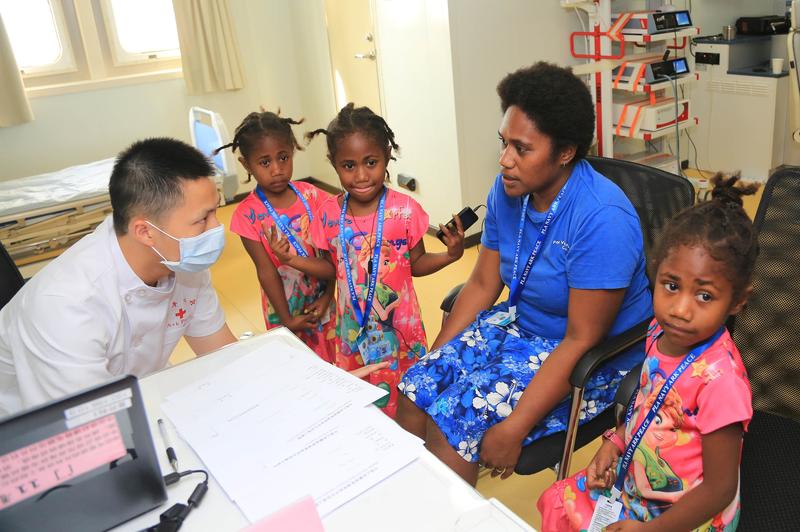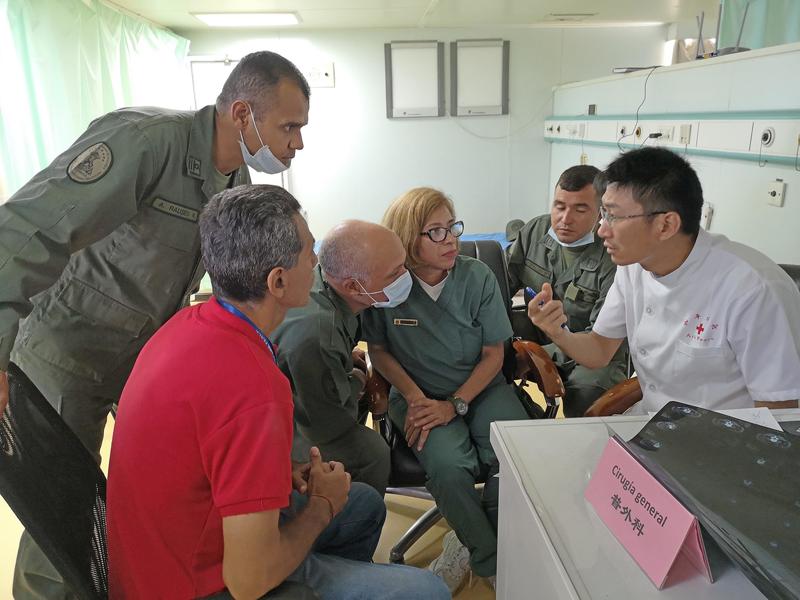The PLA Navy's hospital ship is back in action after a break caused by the COVID-19 pandemic. Jiang Chenglong reports.
 A mother, accompanied by her triplets, consults a Peace Ark doctor in Vanuatu in June 2018. (SHI KUIJI / FOR CHINA DAILY)
A mother, accompanied by her triplets, consults a Peace Ark doctor in Vanuatu in June 2018. (SHI KUIJI / FOR CHINA DAILY)
For Deng Qiang, commander of a Chinese naval vessel, when his ship is voyaging across the oceans, it's not showing the muscles of the armed forces and conducting deterrent activities but spreading the military's belief in world peace.
That's what Deng believes is the "innate advantage" of his command, Peace Ark, a floating medical facility operated by the People's Liberation Army Navy.
Designed as a well-equipped oceangoing clinic, China's first hospital ship with a displacement of over 10,000 metric tons boasts 16 departments, eight operating rooms and more than 300 beds.
In the military sense, the ship's purpose is to provide real-time medical support for injured troops to help them regain combat capability rapidly and boost their confidence on the battlefield, Deng said.
"Meanwhile, we are the most appropriate way of conveying the peace-loving ideals of China's soldiers, by caring for the lives of people worldwide," the 40-year-old said. "We are humanitarians and uphold world peace by healing the sick and helping the dying."
According to information available to the public, since the ship entered service in 2008, it has completed 10 missions overseas, treating more than 230,000 people from 43 countries and regions worldwide.
On the special ship, thousands of people from countries in Africa, Asia and the Pacific Ocean region have regained their sight after receiving cataract surgery, while seven babies have been born in the vessel's operating rooms.
In the three years after the COVID-19 pandemic started, the hospital ship stayed at its home port of Zhoushan, in the eastern province of Zhejiang, undergoing long-term maintenance, the captain said.
"Since 2019, we have strenuously practiced our abilities at home," Deng said. "But no matter whether abroad or at home, we are always ready to do our duty and fulfill our tasks."
On Nov 10, the ship officially started its most recent overseas mission by paying a friendly visit to Indonesia at the invitation of the Southeast Asian country's military.
The ship's crew provided a range of treatments for local people, including outpatient clinics, surgical interventions and inpatient services, according to the Ministry of National Defense.
 A doctor from Peace Ark, a hospital ship operated by the PLA Navy, provides medical treatment at the Maputo School for the Disabled in Maputo, Mozambique, in November 2017. (JIANG SHAN / FOR CHINA DAILY)
A doctor from Peace Ark, a hospital ship operated by the PLA Navy, provides medical treatment at the Maputo School for the Disabled in Maputo, Mozambique, in November 2017. (JIANG SHAN / FOR CHINA DAILY)
Unusual 'thank-you' note
"Thank you very much for helping us, Peace Ark! I love you very much, China! Goodbye!"
Those words were a thank-you note left for the doctors and nurses on the hospital ship by a family in the Philippines. However, far beyond Zhang Hongbing's expectations, the message was not written on paper, in a book or even on a piece of board — instead, it was, scrawled on a makeshift diaper.
Zhang, a 33-year-old physician has been working on the hospital ship since he graduated from university in 2012. From a medical graduate to junior doctor, he has witnessed most of the unforgettable stories that have happened on the ship in the past decade.
The diaper message was written in 2013 when Typhoon Haiyan — one of the strongest tropical storms to hit the North Pacific Ocean in the 21st century — pounded the Philippines (where it was known as Super Typhoon Yolanda) causing tens of thousands of deaths and injuries.
A pregnant woman was in a desperate state as she was due to give birth, but the overwhelmed local medical facilities were unable to provide the necessary treatment.
In desperation, her family turned to the PLA ship, which was conducting an urgent rescue mission in the country.
The woman gave birth safely in the operating room. However, there weren't any diapers for newborns on the ship, so the nurses cut clean bedsheets into squares and used them on the baby.
When the family was about to leave the vessel, the father grabbed a square of linen and wrote his thank-you note.
 A Peace Ark doctor and his Venezuelan counterparts treat a patient together in Venezuela in 2018. (JIANG SHAN / FOR CHINA DAILY)
A Peace Ark doctor and his Venezuelan counterparts treat a patient together in Venezuela in 2018. (JIANG SHAN / FOR CHINA DAILY)
The message touched the crew members so deeply that they still keep the diaper safe and sound.
For Zhang, who traveled outside of China early in his career, the gesture proved that sincerity between peoples from different nations can work both ways, even if international relations are at a low ebb. "As long as you treat people well and sincerely, they will definitely feel it and will treat you the same way," he said.
"Before we docked at the port, small groups of patients were transported to the ship to receive free nursing, medicines and surgeries," Zhang said. "As our reputation spread, more and more local people turned to us for help."
In late 2013, at the request of the Philippine government, China sent medical supplies and related equipment. Peace Ark was ordered to head immediately to the Asian country, despite officially being at rest after completing a 125-day mission to provide volunteer medical services to people in eight countries across the Asia-Pacific region.
Nevertheless, when the order to assemble came, Zhang and his 400 colleagues gathered from various parts of China within 48 hours, and the ship was the first foreign medical vessel to arrive and provide assistance in the Philippines.
In the two weeks that followed, 2,208 local people were treated on the ship, where 44 surgeries were conducted and four babies were born, according to official data.
"No matter what country you come from or what color you are, when you sit in front of me you are just a patient and I am just a doctor who is there to treat your illness," Zhang said.
 Members of the ship's medical team visit an intensive care unit in San Diego, United States, in 2015. (JIANG SHAN / FOR CHINA DAILY)
Members of the ship's medical team visit an intensive care unit in San Diego, United States, in 2015. (JIANG SHAN / FOR CHINA DAILY)
'Diplomat' doctors
"The envoy of light" is what one patient from Vanuatu called Peace Ark, providing the description that impresses Zhang the most. In 2014, the middle-aged man had free cataract surgery on his right eye on the vessel when it was offering free services in the Pacific nation.
Four years later, when the hospital ship paid another visit to the country, the man boarded the ship again with his medical records to ask for similar treatment on his left eye.
"I remember that he said it was the Peace Ark that brought brightness to him twice, and he hoped we could bring more light to his fellow residents in Vanuatu," Zhang said.
"Our core task on overseas missions is to communicate with our friends worldwide. When we go overseas, we are all 'diplomats' who represent China."
Cultural skills
Captain Deng is increasingly convinced that his colleagues on the floating hospital play a significant role in helping people from various parts of the globe become better acquainted with China.
In addition to their ability to maintain medical equipment and offer various treatments, his colleagues are versatile in terms of their many cultural skills, which enable them to "better tell China's story", he said.
"We have an artist in the cooking team, who made a sand painting when foreign dignitaries visited us. We also have a colleague in our radar team who is good at singing and dancing."
For Deng, those colleagues are the real envoys because they help spread friendship and Chinese culture around the world.
According to the defense ministry, since Peace Ark was commissioned, it has received more than 30,000 foreign military and civilian visitors and called on and received more than 230 heads of state and high-ranking officials.
To underline the goodwill the hospital ship has spread in the past 14 years, Senior Colonel Wu Qian, a ministry spokesman, quoted a Chinese saying that dates back about 1,400 years: "Nothing, not even mountains and oceans, can separate people with shared goals and vision."
In Deng's eyes, those shared goals and visions are a common development among countries, which is an important part of Chinese philosophy.
"Only when countries grow together can there be true development. As China has developed, we have thus been able to help more countries worldwide," he said.
"We hope that in peacetime the Peace Ark will not only make a contribution to China, but also take on a much bigger humanitarian responsibility for the people of the whole world."
Contact the writer at jiangchenglong@chinadaily.com.cn


